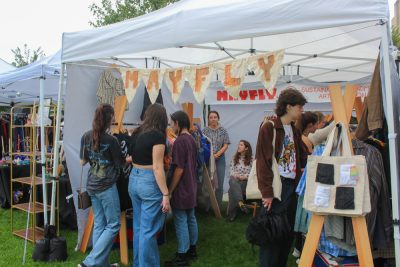As wind threatens tent poles and rain muddies soil on the lawn in front of Time Out Market, flea market vendors stay put while shoppers weave in and out of their stations. It’s Saturday, and the weekend is blooming with flea market events.
Fenway Flea, a market hosting small businesses and independent artists, is one of many in Boston. These stores are built on a foundation that was the first of its kind — Boston is home to some of the earliest thrift stores in the United States, with Goodwill opening in 1902.

The struggle that comes with defining what a flea market entails is a direct testament to their versatility. Strolling through Fenway Flea, visitors are greeted with a wide variety of items — thrifted garments, gleaming jewelry, handmade candles, vintage art and much more. It’s an orchestrated party of diverse products and personalities.
One such vendor is Caroline Anastasi, who collects and sells antique glassware under her brand The Serpent’s Tail. Anastasi first started selling at the lawn this summer, despite considering glassware an “outlier” in the scene.
“I was collecting a lot of glass and making candles with the glassware I was finding,” Anastasi said. “And then I was just hoarding and I was inspired to sell some stuff.”
Mere feet away, Sarah Moretti’s Astral Plains booth overflows with trendy thrifted tops, boots and everything in between. With over 12,000 Instagram followers and seven years in the business, she shares Anastasi’s love for “treasure hunting.”
“Boston, traditionally, is such a white-collar town that hasn’t necessarily broken the boundary of business-casual and I think this is breaking that boundary,” Moretti said. “[The flea market scene is] introducing a creative sense of styling a wardrobe in a black, white and gray city.”
A few stops down the C-Line, another major thrift store holds its doors open for those searching for themselves. United Parish in Brookline hosts Thrifty Threads, a volunteer-run thrift store crowded with clothing, houseware, jewelry, shoes and so much more. According to their website, many of the items are less than $10.
The store is open Fridays and Saturdays from 12 p.m. to 3 p.m.
Rachel Silverman, co-convener of the thrift store and a volunteer for about 10 years, said Thrifty Threads is unique among other thrift stores around Boston because they’re “putting the money back into the community.”
“The money we raise, it creates the space that we’re in,” Silverman said.
Silverman said the new post-pandemic world is a catalyst for this desperate desire for connection.
“People are eager to be together, people want to be in community, and they want to come together here, and when they go out, they want to have a look that feels good … this is our thing: look good, feel good, do good,” Silverman said. “In the end, all we have is our connection to each other.”
Flea markets excel at doing this because of their affordability, inclusiveness and fluidity, Silverman said.
“Thrifting is a safe place for people to explore different ways of expressing themselves,” she said.
Although more affordable, thrifting still comes with a price. Azul Villarreal, lifelong thrifter and a flea market regular, raised a concern about this.
“At thrift stores, they’re reselling for way more money, but I feel like it wasn’t like that growing up,” Villarreal said. “Because thrifting and buying secondhand apparel was not as popular back then than it is now.”
Resellers have emerged in conjunction with the pop-up of new markets. Some online vendors thrift in low-income neighborhoods and apply astronomical mark-ups to generate maximum profit.
Thrifty Threads treads carefully in this territory — emphasizing the cyclical nature of the thrift store. All the merchandise is funneled by donations and all profit is donated back into the community. The store sends over half of the donations it receives to nonprofit organizations that are “working directly with people in need,” according to their website.
Thrifty Threads, Fenway Flea, FOUND, SoWa, the Brighton Bazaar, Boston Open Market, Harvard Flea Market and many more scatter Boston as different places to buy your clothes.
“Whatever brought this to Boston, I’m glad,” Anastasi said. “I think Boston needed … more artistry.”















































































































